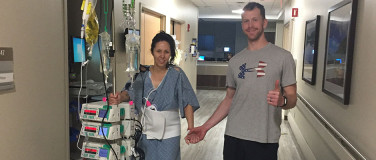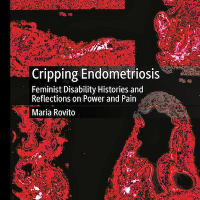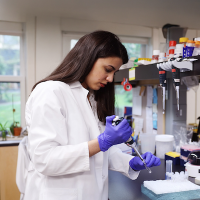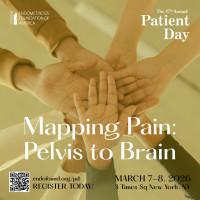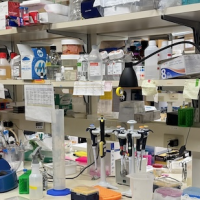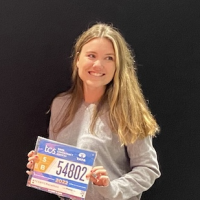I was eleven when I first got my period. After a few months I started vomiting every time my new “gift” showed up. It was the type of vomiting that couldn’t be controlled; I’d walk through hallways in my middle school years later and could still see the stains in the carpet from when I couldn’t make it to the bathroom in time. Sweat soaked through my shirt as my stomach churned. I couldn’t keep my head up in class because the cold desk felt so much better on my face than trying to summon up the energy to pretend to focus on Social Studies. All I would think about was pinching my fingernails into my sweaty palms to distract me from the war scene going on in my internal organs. When girls in my class started getting periods too, they were all still able to swim at pool parties, keep up in gym class, and finish their lunches without getting nauseous. All I wanted was to fit in with my middle school friends, but I felt weak and a little pathetic not being able to handle a little bleeding. Those days, I used to think of my period pain as my insides being shredded over and over again.
My parents knew of my symptoms because of the incessant vomiting and the many days they had to pick me up early from school and found me crying in the nurse’s office. Although my dad is a physician, which is one of the greatest privileges I’ve had in my journey, my mom warned me to not talk to him or other males, including my older brother, about my period because it was a “girl’s problem.” Around the same time every month, when I’d be bedridden, my dad would palpate my stomach and would ask me what I had eaten the day before that may have caused the nausea, vomiting, and pain. I was furious. I wanted to scream at him that it was my period; that it was because someone was taking a chain saw and drilling it through a third of my body. But that third consisted of body parts that my mom, my teachers, and my friends had ingrained in me as unspeakable because others had ingrained this same shame in their minds for years.
The first gynecologist I ever went to see was Dr. S who put me on birth control at the age of twelve. The next three years consisted of me crying, vomiting, and bleeding through pads and layers of bedsheets and towels for ten days every month. Dr. S did not have experience working with patients as young as me so she regretfully sent me to other doctors in hopes that they could better help me. Throughout the next few years, in addition to the vomiting, I also started having diarrhea every month with my period. We tried a number of different brands of birth control in combination with ibuprofen, yet I continued to feel worse, started having breakthrough bleeding in between my period, and gained around forty pounds.
During this time, I had ultrasounds, an MRI, numerous blood tests, and GI consults. Besides costing over $10,000, all that we discovered was that I probably had irritable bowel syndrome. Every test and scan came back negative and would cause my mom to sigh in relief. As more and more of my tests came back normal, I felt increasingly like those around me stopped feeling a sense of urgency surrounding my health. But each test result made me question myself. I thought back and would tell myself, “maybe you’re not in that much pain” and “maybe these types of period symptoms are in fact normal.”
Over time my symptoms would reawaken me to the abnormality of the situation and I insisted to my parents that I was still in a great deal of pain. They then made an appointment with a gynecologist who specialized in pediatric cases. In our first meeting, the doctor told me, a fifteen-year-old, that the easiest solution would be for me to just get pregnant and then laughed. My parents and I did not join in the laughter. He then asked me if I ever heard of the word “endometriosis” and pulled out charts and diagrams to explain to me what it was. A few months later, the doctor performed a laparoscopy that showed that I did in fact have endometriosis: there was tissue resembling the lining of my uterus in seven different locations in my body including my colon, which could explain some of my bowel inflammations. Hearing this made me happier than I could explain. It wasn’t in my head. My pain was real.
In the laparoscopy, the doctor burnt and removed the abnormal growth of tissue to prevent scarring of my organs and possible fertility problems. This removal of tissue, however, did not make my immense pain with every period subside. I was bleeding so heavily that I couldn’t participate in gym class and had to be marked as excused for the whole semester. My gym teacher seemed a tad annoyed at my inability to participate and once had me stand off to the sidelines watching because I didn’t have the proper excuse form from my doctor to go sit in the library with a little bit of dignity. I wished so badly that day that I had a broken arm with a cast instead so everyone could see that my ailment was legitimate. The doctor then tried putting me on a new type of birth control in the form of an injection every few months. This medication gave me more breakthrough bleeding in between my periods and menopausal symptoms at sixteen. My joints started burning at the slightest movement. I remember sitting in history class with my fingers burning after just taking a few lines of notes, my knees still on fire from the walk up the stairs.
The next few years, I tried more forms of birth control and went to see different doctors. I had more ultrasounds and blood tests, and as each came back negative, everyone seemed to be more and more fed up with me. My new doctor even said to me, “I think you just have a low pain tolerance,” after she tried palpating my pelvis and I flinched because I was just a teenage girl who was still not comfortable with people touching me there. Most of the doctors ended up telling me to try a new diet, meditate, and relax a little bit.
Even on days when I wasn’t bleeding very heavily, I was in horrible, exhausting pain. I would sit in driver’s ed class again clenching my fingernails into my sweaty palms. By this point the pain had shifted from the shredding chainsaw pain to what felt like someone was taking a dagger and shoving it in my pelvis numerous times and then flailing it all around. By the time I graduated high school, the doctors were out of suggestions for me. I had a diagnosis, I was on birth control, I had lost some weight, but my pain was still there. My periods were still draining, and I kept spotting and breakthrough bleeding in between my periods. To top it off, my IBS had gotten worse and I spent most days having diarrhea. I was again told to meditate, try some teas, and manage my stress levels.
When I turned twenty my period started getting lighter and shorter. I went from taking around six to ten painkillers a day to one or two. By the time I was twenty-one I was down to not taking any painkillers. I was elated. I started working out more and felt like I had control of my body. At the end of that year I went to my doctor and told her I felt good and didn’t think I needed to be on birth control anymore. I still had diarrhea most days but at least I didn’t have chainsaws or daggers being shoved in my uterus. I spent a year or two with no pain and looked back at the previous years thinking that maybe I really was just young and naïve and didn’t understand my pain. It was just a period. It was just cramps. Maybe it really was just my stress levels.
Towards the end of my first year of medical school, at the age of twenty-three, I started having cramps during my period again. I started taking ibuprofen again. I had to stop working out on the days I was on my period. I started using heating pads again. I started having bloody stools before my period started. After a few months of this, I woke up in the middle of the night in the summer, a month before starting my second year of medical school, in excruciating pain. The dagger was back in my pelvis. I was being stabbed over and over again. I stayed awake throughout the rest of the night, writhing in blinding pain. In the morning, I called my parents who were in the next room, like I used to when I was younger and I couldn’t muster the strength to walk a few feet over to them. They rushed into my room and I hugged my mom and sobbed because I couldn’t believe the pain that I had dealt with for so many years and finally thought I had gotten past was back in my life. I couldn’t believe I had been tricked into thinking I was all better.
The only doctor who could see me in such short notice was Dr. S, my first gynecologist I saw when I was twelve. I was visibly shaking in the waiting room because I was not ready for someone to tell me again that I had a low pain tolerance. I didn’t want to meditate, I wanted to feel better. I was older now, I had studied a little bit of medicine, and I knew with a clear head that my pain was real. My pain this whole time had been real. At age twenty-three I could barely handle the shredding, stabbing, gruesome pain so of course it was bad when I was eleven. I was angry for my younger self. I was angry that because I didn’t have the academic vocabulary, was a nervous child in a medical setting, and was a girl who was made to feel ashamed of her womanhood, I thought for even a second that my pain may not have been real.
When I went in to see Dr. S, who was 83 now, I sat down in her office, thinking she’d say it was probably just my stress levels. Instead she said, “So your endometriosis symptoms are back.” It had been years since someone had said “endometriosis” to me because most people had assumed that I was bad at dealing with period cramp pain. She told me, with sympathy in her eyes and a tremor in her voice, that she remembers the pain with which I came in when I was so young. She said this pain is unacceptable and she wanted to do an in-depth exam and then prescribe me strong birth control pills to completely stop my period and, in a few years, to have another laparoscopy to remove the endometriosis that had likely grown back. I walked away from that appointment last month, smiling ear to ear. I was still in excruciating pain, but she believed me and that made all the difference.
Kanwal's parents immigrated from Pakistan in the early 90's to New York, eventually moving to Rocky Hill, Connecticut where Kanwal was born and raised. She attended an all girls high school that gave her an empowered voice and passion for advocating for women's education. She then went on to Boston College where she majored in Biology and minored in Women's and Gender Studies and Ancient Civilizations and led the Student Admission Program and Red Cross. She is currently a second year medical student at Tulane University School of Medicine in New Orleans and hopes to become a pediatrician, championing the voices of younger patients, especially those of young females.
Editor's note: Would you like to contribute to EndoStories? Click here to learn how to submit your work.
*Patient stories submitted to EndoFound.org are the views of the patient and not necessarily those of the foundation. All testimonials are from real patients, and may not reflect the typical patient’s experience, and are not intended to represent or guarantee that anyone will achieve the same or similar results.




